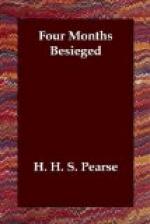Tommy is ready and eager to try conclusions with the enemy on these terms, if his leaders will only give him the chance, but meanwhile our movements take the form of reconnaissances that lead to no tangible advantages either in lessening the vigour of our adversary’s bombardment or in loosening any links in the chain of investment by which we are bound. The situation is certainly curious and interesting historically as an event for which no exact parallel can be found in the annals of England’s wars.
In writing of futile reconnaissances it is hardly necessary that I should disclaim all intention of ignoring the excellent work done by individual regiments on which the duties of patrolling have by turns fallen. Dragoon Guards, Lancers, Hussars, Imperial Light Horse, Natal Carbineers, and Border Mounted Rifles, have known little real rest for days past. When not actually scouting the cavalry have been either on outpost within touch of the enemy, or bivouacked beside their horses ready for any emergency. The extreme tension necessitating all these precautions may be relaxed somewhat now, but still we rely on the mounted troops for information of every movement among the besiegers, and so far trust in their alertness has been fully justified. The morning after last Thursday’s attack Major Marling pushed his patrols of the 18th Hussars farther westward than they had been able to get since communications were interrupted. Rumours, since confirmed, that the Boers had suffered very heavily in their fruitless attack the previous day, suggested the possibility of their having evacuated some positions. Major Marling may have begun to take that view too when he saw a white flag showing above the serrated crest of Rifleman’s Ridge, which is generally but too vaguely described as Blaauwbank, where the Boers have at least one powerful field-gun mounted. Under a responsive flag of truce Major Marling and a non-commissioned officer advanced to parley with the enemy, whose pacific, if not submissive, spirit was thus manifested. The field-cornet in charge said he understood there were to be no hostilities that day. The English officer knew nothing of any armistice, but agreed to retire without pushing the patrol farther in that particular direction. As he and his comrades went back to join their main




